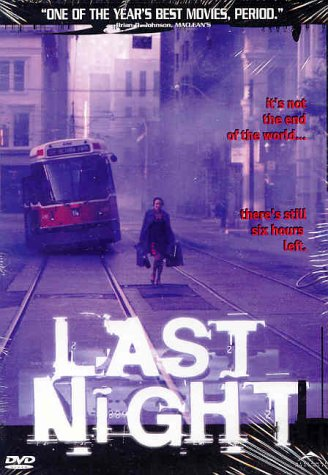
LAST NIGHT
Canada, 1998, 95 minutes, Colour.
Don Mc Kellar, Sandra Oh, Callum Keith Rennie, Sarah Polly, David Cronenberg, Robin Gammell, Roberta Maxwell, Tracey Wright, Michael Mc Murtrie, Genevieve Bujold.
Directed by Don Mc Kellar.
Last Night was released on the eve of the millennium. This is a rather low-key perspective on the end of the 20th century – especially in comparison with the apocalyptic thrillers coming from the United States.
The film focuses on an anonymous Canadian city, the end of the world to come at midnight. The citizens seem to accept that the world is coming to an end and prepare for their final rituals and their deaths. The film focuses on Patrick Wheeler, his sister, his parents. There are also other central characters, especially a business executive and his colleague. His wife is trying to join her husband but is unable to get through the city. There is also a self-confessed lothario who is taking the final opportunities for sexual activity, including with his high school teacher.
This motley group of characters is meant to represent society as a whole – although, critics complained that they were fairly middle class.
The film quietly raises issues of what one would do in the face of the impending end of the world, whether one focused on oneself and one’s life or one forgot everything and wanted to make merry before the end.
Actor Don Mc Kellar makes a directing debut with Last Night. He has a strong local Canadian cast. This film won an OCIC award at an Argentinian film festival.
1.The idea behind the film? Ordinary Canadians faced with the end of the world? The end – and its meaning, meaninglessness? The film released on the eve of the end of the 20th century?
2.The city, Canada, ordinary people, homes and streets, revellers and cars, businesses? The musical score and the range of songs? The irony of “Last Night I Didn't Get to Sleep at All”, “Silent Night”?
3.The focus on the average people, their attitudes, behaviour judgments?
4.The focus on Patrick, his dinner with his family, the Christmas dinner? His relationship with his parents, with his sister? Jennifer and her decision to go to a party, her relationship with her boyfriend, Alex? Patrick’s parents, their wanting him to stay home? The desire to spend the final hours together?
5.Duncan, his work with the gas company, Donna and her loyal service, the decision to have the gas services functioning until the end of the world? Their work at the factory at the office? Duncan’s wife, Sandra? Her attempts to get home, the car, the revellers, wrecking the car? The collapse of civil order?
6.Craig, his attitude towards women, lovemaking? The encounter with Mrs Carleton, their sexual encounter?
7.Patrick and his meeting Sandra, his helping her, going to Craig’s house, her getting the car, her further attempts to get home, her continued inability to drive through the city?
8.Craig, his explanation of himself, his attitude towards Patrick, his wanting to experiment with Patrick, Patrick’s reaction and refusal?
9.Duncan, at home, his being murdered, the anonymity of the killer?
10.Craig, the sexual encounter with Donna? Sandra’s return, her decision to have a suicide pact? The intention of the pact with her husband – but his being killed? Patrick’s agreement?
11.Their getting the guns, their planting them at each other’s temples, instead of shooting, kissing?
12.The perceptions of human nature, optimistic and pessimistic? Life and death? Patrick as Everyman – in family, in himself, the grief at his dead girlfriend, his encounters with Craig, Sandra? The challenge to the audience to speculate about behaviour with the end of the world?